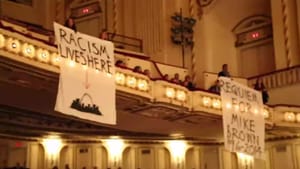Stay in the Loop
BSR publishes on a weekly schedule, with an email newsletter every Wednesday and Thursday morning. There’s no paywall, and subscribing is always free.
The sanctity of the concert hall?
Michael Brown Protest at the St. Louis Symphony

A protest in a concert hall? But as I read the context, I got it: After the intermission at a St. Louis Symphony concert, as the conductor prepared to begin Brahms's Requiem (an idiosyncratic mass for the dead), protestors sang a short a cappella song asking the audience whose side they are on regarding the death of Michael Brown. This was accompanied by the unfurling of a banner-sized picture of Brown, with his birth and death dates, followed by the peaceful departure of the protesters. (Read an NPR account here.)
I learned of the incident via a post on a Facebook page devoted to black composers. The first comment was from a conductor, who found the demonstration to be inappropriate. My reaction was that the intended message seemed to be, “No justice, no peace.” Michael Brown has faded from the public consciousness — understandably, with ISIS and Ebola to think about. There has been no resolution in the case, either to clear police officer Darren Wilson of the shooting or to arrest him for it. An apology from the Ferguson police chief got brief mention, along with the exorbitant fees being charged to those seeking documents regarding the case, all of it allegedly public information. The protest was brief and took place immediately after intermission rather than between movements. The demonstrators had purchased tickets. All very civilized.
Indifferent to “reality”?
Not to the conductor who commented on Facebook. Preparing to perform a major work like the Brahms requires the utmost concentration, he argued, and having a disruption just prior to the downbeat would be grounds for kicking someone's ass. Concert halls, and the great works performed in them, are sacred, providing a much-needed respite from the world outside. They are apolitical and should be indifferent to “reality.”
Besides, the disruption aroused more contempt than sympathy, resulting in a discussion primarily about the protest, not Michael Brown. Imposing on others in that way is a kind of terrorism, he said. What would happen if having flash mobs in classical concerts caught on? It would be one thing in a pop concert — nobody would care. But in classical concerts, one should be free to bask in the glow of the sublime.
It's important to note that the maestro thinks injustice should be fought, just elsewhere. And that he doesn't assume Brown's death to be a case of excessive force, necessarily.
Nothing in a vacuum
On one hand, I know how challenging it would be to perform something like Pictures at an Exhibition if someone broke into song as my hands were about to touch the keys. On the other, I think it's fallacious to say that classical music is always apolitical. There are political overtones to the orchestra made up of Arab and Israeli youth, the performances at the Berlin Wall around the time it came down, the plot of The Marriage of Figaro — even the operas of Giuseppe Verdi, which tended to have hidden meanings if you were Italian and wanted the country to unify (cries of “Viva Verdi” weren't necessarily about the composer — VERDI also stood for “Vittorio Emmanuel, Re d'Italia”).
Certainly, some were alienated by the Brown protest, although some (a minority) applauded. As for “terrorism,” what a luxury it is to live in America, as opposed to, say, Iraq, where one can apply that label to what took place in St. Louis and mean it. I think it's telling that nobody in the audience even lodged an official complaint.
The question remains, however, whether a classical concert should be a place people can go to leave the cares of the world behind and commune with the exalted, uninterrupted. I suppose the answer depends on whether or not you think that listening to live classical music is on a higher plane than every other experience. I find many pieces to be spiritually uplifting and wouldn't be happy if someone decided to disturb my enjoyment.
That said, it might be good to get over ourselves.
Who should be heard?
I have the utmost respect for classical music and certainly prefer to be heard when I play (as do popular musicians — my son's former drumming teacher found the quiet, attentive audience at a recent performance in the UK wonderfully refreshing). On the other hand, when we make it too special, it becomes the province of an elite few — a “few” that is becoming fewer and fewer. The protest may have backfired, in the maestro's opinion, but the pedestal approach to classical music isn't doing so well, either.
The conductor said that yelling in an unusual location isn't the way to attract others to our cause. I submit that when people don't want to hear you, you can't change the situation unless you make some noise. All civil disobedience is inconvenient to someone. Those tourists at the Washington Mall were probably not very happy to find the reflecting pool blocked by a bunch of black people listening to some guy drone on about his dreams. And I can only imagine the myriad curses evoked by the blocked roads that accompany mass gatherings like the one a few weeks ago regarding climate change.
There are many ways to express displeasure, and some of them cause lasting damage — throwing paint on a fur coat, for example, or, more dramatically, setting off a car bomb in a crowded market. What happened in St. Louis was brief, and while the conductor might have had a few moments of confusion, I suspect Brahms survived.
Sign up for our newsletter
All of the week's new articles, all in one place. Sign up for the free weekly BSR newsletters, and don't miss a conversation.

 Maria Thompson Corley
Maria Thompson Corley